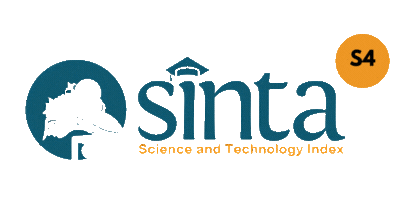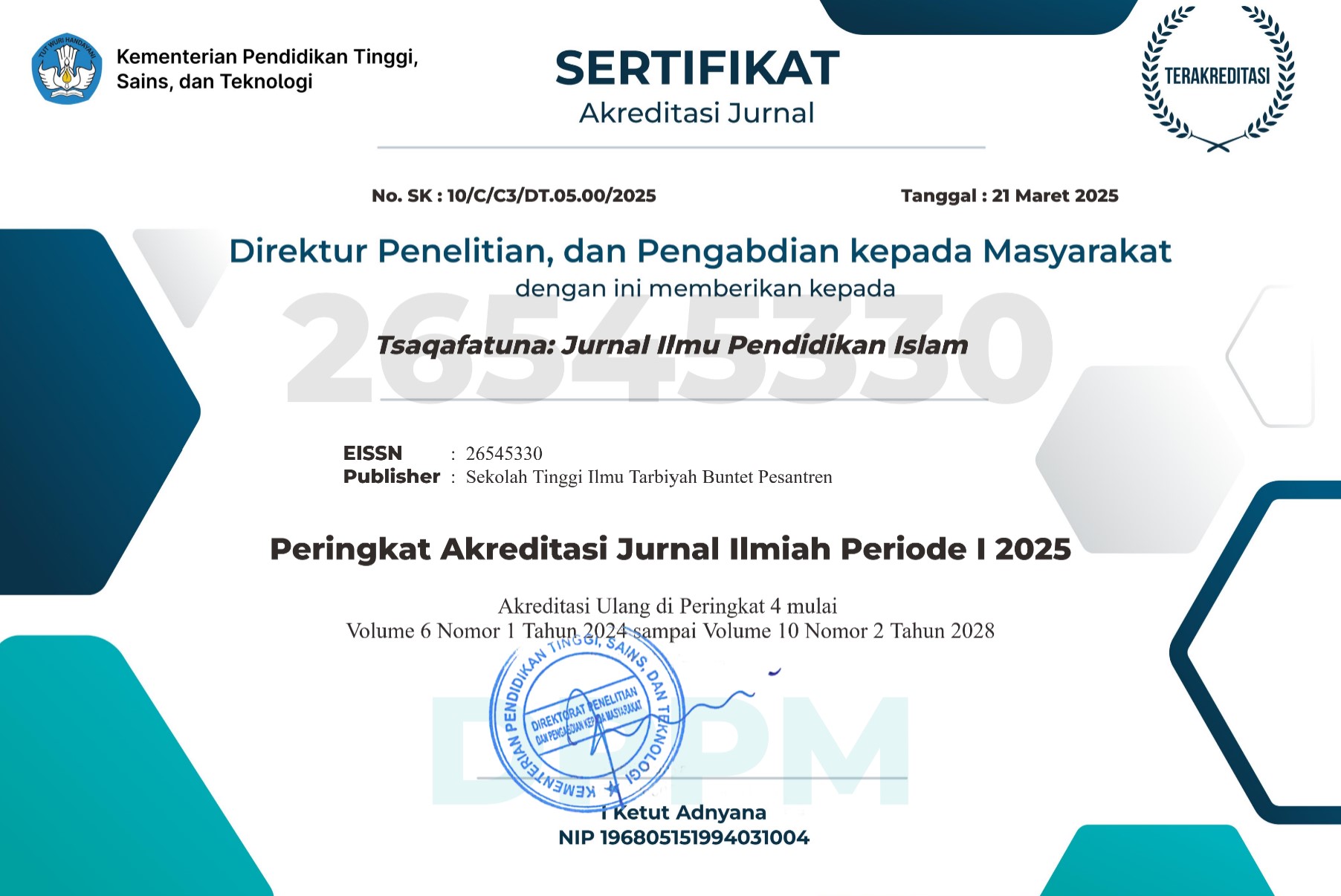Dilema Nilai Islam dan Kebutuhan Pasar Kerja:
Perspektif Mahasiswa Tentang Kurikulum PTKI
DOI:
https://doi.org/10.54213/tsaqafatuna.v7i2.689Keywords:
Curriculum, Islamic Higher Education, Student ViewsAbstract
Islamic Religious Higher Education (PTKI) faces the challenge of balancing the idealism of Islamic values with the pragmatic demands of the labor market. This research aims to explore students' perspectives on this dilemma within the PTKI curriculum. Using a mixed-methods approach, this study collected quantitative data through a survey of 99 students and qualitative data through in-depth interviews. The findings reveal a significant perception gap: a majority of students (41.4%) feel the curriculum is imbalanced and overly theoretical, with 54.6% considering it irrelevant to current job market needs. This critical view is significantly more pronounced among students with internship experience (62.5%) compared to those without (33.3%). Despite this, an overwhelming majority of students (96%) do not desire a dichotomy but rather support an integrated curriculum that explicitly combines Islamic values with professional skills. The study concludes that the current theory-centric curriculum model is inadequate. It is recommended that the PTKI curriculum be reconstructed towards an applicative hybrid model that integrates theory and practice, thereby producing graduates who are not only professionally competent but also possess strong moral integrity
Downloads
References
Adelliani, N., Sucirahayu, C. A., & Zanjabila, A. R. (2023). Analisis tematik pada penelitian kualitatif. Penerbit Salemba.
Aini, L., Manik, C. W., Ginting, H. N. B., Salsabila, S., & Hidayat, N. (2025). Analisis Bonus Demografi Ditengah Tingginya Pengangguran Terdidik di Indonesia. Geosfera: Jurnal Penelitian Geografi, 4(1), 86–96.
Al-Azizi, A., Hidayah, N. R., & abu Bakar,
M. Y. (2024). Eksistensi Perguruan Tinggi Islam di Indonesia. Jurnal Ilmu Pendidikan Islam, 22(4), 272–285.
Alfian, M., Herningrum, I., & Putra, P. H. (2025). Perspective of Islamic Religious Education Study Program Students on the Islamic Education Curriculum in Indonesia. Scaffolding: Jurnal Pendidikan Islam Dan Multikulturalisme, 7(1), 578–594. https://doi.org/10.37680/scaffolding.v7i1.7146
Arlina, U., Qomar, M., & Aziz, A. (2024). Implementasi Kebijakan Merdeka Belajar Kampus Merdeka (Mbkm) Di Perguruan Tinggi Keagamaan Islam (Ptki). SKILLS: Jurnal Riset Dan Studi Manajemen Pendidikan Islam, 34–50.
Aziz, A., Rama, B., & Mahmud, M. N. (2024). The Dichotomy of General Science and Religion in a Review of
the Philosophy of Islamic Education: Dikotomi Ilmu Pengetahuan Umum dan Agama dalam Tinjauan Filsafat Pendidikan Islam. Journal of Islamic Studies and Humanities, 1(1), 12–26.
Bank, W. (2019). Concept Stage Program Information Document (PID) - Indonesia Skills Development Project. https://documents1.worldbank.org
BPS, B.P.S. (2023). Tingkat Pengangguran Terbuka (TPT) sebesar 5,32 persen dan Rata-rata upah buruh sebesar 3,18 juta rupiah per bulan. https://www.bps.go.id
Creswell, J. W., & Plano Clark, V. L. (2018). Designing and Conducting Mixed Methods Research. SAGE Publications, 3rd Editio.
Irawan, I., & Mahmud, M. (2017, May). Strategic Management System as The Internationalization Policy of Indonesian Islamic Higher Education. In 1st Yogyakarta International Conference on Educational Management/Administration and Pedagogy (YICEMAP 2017) 150-156).https://doi.org/10.2991/yicemap-17.2017.26
Kenanga, B. D., & Aryani, Z. (2024). Pengembangan Kurikulum Berbasis Kompetensi: Membangun Generasi Masa Depan. Jurnal Insan Cita Pendidikan, 3(1), 1–5. https://doi.org/10.56799/jceki.v4i3.6920
Kominfo. (2024). Menkominfo Ungkap Indonesia Butuh 9 Juta Talenta Digital hingga 2030.
https://investortrust.id/business/43880
/menkominfo-ungkap-indonesia- butuh-9-juta-talenta-digital-hingga- 2030
Laili, N., & Pradikto, S. (2025). Reformasi Kurikulum Pendidikan: Menyelaraskan Kebutuhan Akademik Dan Keterampilan Hidup. Integrative Perspectives of Social and Science Journal, 2(01 Februari), 878–887.
Mulyana, R., & Umiarso, U. (2023). Epistemologi Pendidikan Islam: Dari Paradigma Teosentris Ke Teoantroposentris; Dari Metode Parsialistik Ke Integralistik- Interkonektif. Remaja Rosdakarya.
Mulyani, Y., Mutaqin, M. Z., & Arifin, M. (2025). Kontroversi Islamisasi Ilmu Pengetahuan Tinjauan Pemikiran Ismail Raji Alfaruqi Dan Implementasi Ilmu Pengetahuan Terhadap Peserta Didik. Jurnal Kajian Islam Modern, 13(1), 92–102. https://doi.org/10.56406/jurnalkajianislammodern.v13i1.721
Nuraeni, R., & Irawan, I. (2021). Implementation of Scientific Integration Concept Monitoring and Evaluation on The Pesantren Learning Curriculum. Altanzim: Jurnal Manajemen Pendidikan Islam, 5(2), 86–95. https://doi.org/10.33650/al-tanzim.v5i2.2186
Ramadhan, S. A. (2025). Moderasi Islam: Membentuk Idealitas Pemahaman Keagamaan Antar Sesama Umat Islam Dalam Dunia Pendidikan. Adiba: Journal Of Education, 4(4), 1–21.
Safriani, A. (2015). Experiential learning for language teaching. Proceedings of Halaqoh Nasional Dan Seminar Internasional Pendidikan Islam, 386– 391.
Siregar, K. E., & Putra, A. M. S. (2024). The Efficiency of Islamic Higher Education Curriculum in Indonesia: A Literature Review on Improving Intellectual Competence and Work Readiness Through Islamic Religious Education. International Journal of Studies in International Education. https://international.aripi.or.id/index.p hp/IJSIE/article/view/111
Sulistiawan, A., Sari, E. Y. D., & Situmorang, N. Z. (2021). Validitas dan reliabilitas konstruk komitmen organisasi dengan pendekatan Confirmatory Factor Analysis (CFA). Psikostudia: Jurnal Psikologi, 10(1), 61–68. http://dx.doi.org/10.30872/psikostudia.v10i1.5478
Wajdi, M. B. N. (2016). Metamorfosa Perguruan Tinggi Agama Islam. AT- Tahdzib: Jurnal Studi Islam Dan Muamalah, 4(1), 92–109.
Wulandari, S., Nurdin, A., & Fadilah, R. (2023). Persepsi mahasiswa terhadap integrasi nilai keislaman pada pembelajaran Biologi Dasar. Prosiding Seminar Nasional Pendidikan Biologi FKIP UNS, 20(1), 144–152.
https://doi.org/10.20961/prosbi.v20i1. 97248
Wynda, H. (2025). The Transformasi Pendidikan Tinggi: Mengasah Soft skills untuk Menjawab Tantangan Kerja di Era Society 5.0. Jurnal Sains Sosio Humaniora, 9(1), 91–102. https://doi.org/10.22437/jssh.v9i1.39000
Yulindaputri, T., & Sutrisno, S. (2023). Analisis Problematika PTKIN di Indonesia dalam Melaksanakan Kebijakan Merdeka Belajar Kampus Merdeka. Al-Idarah: Jurnal Kependidikan Islam, 13(1), 67–79. https://doi.org/10.24042/alidarah.v13i1.15385
Yumesri, Y. (2024). Etika Dalam Peneltian Ilmiah. Jurnal Genta Mulia, 15(2), 63–
69.











